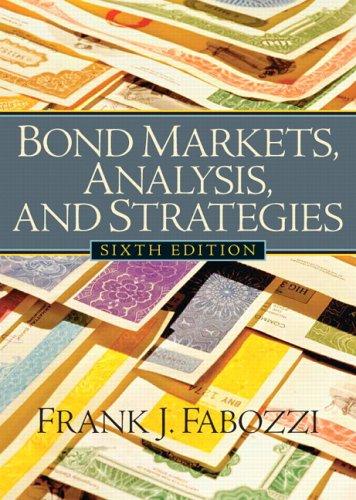Question
3) The following is a comprehensive hedging example. Answer parts (a)-(g). Suppose today is January 2 and BSK, Inc. is a US firm that has
3) The following is a comprehensive hedging example. Answer parts (a)-(g).
Suppose today is January 2 and BSK, Inc. is a US firm that has the following Canadian dollar (CAD) and Australian dollars (AUD) cash flows due in 6 months (July 2):
Receivables Payables
Canadian dollar CAD2,000,000 CAD1,735,000
AUD AUD 2,765,000 AUD 3,700,000
Suppose also you have the following information regarding foreign exchange rates, interest rates, and futures and options prices, all reported as of January 2:
Bid Ask
Spot: CAD 1.2605/$ CAD 1.2610/$
AUD 1.3610/$ AUD 1.3615/$
6-mo forward CAD 1.2673/$ CAD 1.2682/$
AUD 1.3500/$ AUD 1.3515/$
Annualized interest rates on 6-month deposits and 6-month loans:
Deposit Lending
US 2.35 2.45
Canada 2.80 2.90
Australia 1.50 1.58
Assume Futures Prices on Jan 2 $/CAD $/AUD
Sept. futures (futures matures on September15) $0.7880/CAD $0.7420/AUD
(1 CAD contract = CAD 100,000; 1AUD contract = AUD100,000, both maturing in September, and one cannot go long or short fractions of a contract)
Options market prices on Jan. 2, (Note: Quotes below are in US cents/1FX on Sept. Contracts):
Call Prem Put Prem
Sept option on CAD w/ 80 strike 1.17 1.45
Sept option on AUD w/74 strike 1.14 1.90
(Suppose 1 CAD options contract = CAD50,000; 1AUD options contract = 50,000 AUD, and assume one cannot buy fractions of the options contracts)
- (4 points) What is the firms net exposure in each currency? How would currency correlations (in general) affect your assessment of the firms total exposure to exchange risk?
- (6 points) Suppose BSK, Inc. wishes to hedge its net foreign exchange rate exposure in each currency with forward hedges (that is, regardless of your answer to (a), it plans on hedging its net exposure in CAD and AUD separately). What will the firm pay or receive (number of $) for CAD and AUD 6 months from Jan.2 (i.e. on July 2) if it hedges its risks in the forward market?
- (8 points) Suppose instead the firm considers hedging its net foreign exchange exposures in each currency with money market hedges. What will the firm pay or receive (number of $) for CAD and AUD 6 months from Jan.2 (i.e. on July 2) if it hedges its risks using money market hedges (given the data provided in the problem)?
- (10 points) Suppose the firm decides to hedge its foreign exchange risks using futures market hedges. Suppose also the firm opens positions in the futures market on January 2 at the prices quoted at the beginning of the problem (at the Jan. 2 prices shown above).
- How would the firm hedge its risk in the futures market? (ie. how many contracts, would it go long or short?)
- Suppose on July 2 (6 months from Jan.2), the spot exchange rates and the September futures prices are as follows:
Bid Ask
Spot: CAD 1.2682/$ CAD 1.2690/$
AUD 1.3508/$ AUD 1.3523/$
September futures prices on July 2:
Canadian dollar Sept. futures prices: $0.7835/CAD
Australian dollar Sept. futures prices: $0.7438/AUD
Suppose that the September futures contracts mature on September 15. Assume, however, the firm decides to close out its futures positions on July 2 since its foreign exchange receivables and payables come due on that date. What will the firm pay or receive (number of $) for CAD and AUD six months from now (on July 2) given that it hedged its positions using futures market?
- (10 points) Suppose now the firm wishes to hedge its foreign exchange risk using foreign exchange options.
(i) What kind of options should the firm purchase to hedge its risk (i.e. calls or puts)? How many contracts should the firm purchase?
(ii) Assume on January 2 the firm buys options at the prices quoted at the beginning of the problem. Suppose the spot rates on July 2 turn out to be the same as in part (d) above:
Bid Ask
Spot: CAD 1.2682/$ CAD 1.2690/$
AUD 1.3508/$ AUD 1.3523/$
Given these spot rates, on July 2 will the firm exercise the options it had purchased? What will the firm pay or receive (number of $) for CAD and AUD 6 months from Jan.2 (i.e. on July 2) given it hedged its risk in the options market (consider all costs)?
- ( 4 points) Suppose the firm is considering range forward position hedges for the CAD & AUD positions. How would a range forward be implemented for each of the net positions in this problem (note: simply state how you would construct, no calculations)?
- (8 points) Compare the four hedges considered above--What are some advantages/disadvantages each? Of the choices in (b)-(e), which type of hedge would the firm likely choose and why?
- (6 points) Suppose the payables/receivables are expected to be maintained for years into the future. What does this imply for BSKs operating or economic exposure? What actions could BSK take to reduce its operating exposure to exchange risk over time
Step by Step Solution
There are 3 Steps involved in it
Step: 1

Get Instant Access to Expert-Tailored Solutions
See step-by-step solutions with expert insights and AI powered tools for academic success
Step: 2

Step: 3

Ace Your Homework with AI
Get the answers you need in no time with our AI-driven, step-by-step assistance
Get Started


